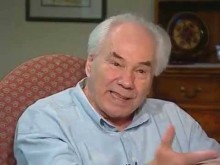A series of blogs from recovery coach Beth Burgess of Smyls. Beth has written articles about addiction recovery for the Huffington Post which means she has had a large audience.
‘A Personal Tribute: Ernie Kurtz, 1935 – 2015’ by Bill White
 ‘Ernest Kurtz, who made landmark contributions to the study of addiction recovery, died January 19, 2015 of pancreatic cancer. Following publication of Not-God: A History of Alcoholics Anonymous in 1979, Kurtz focused his studies on the growing varieties of recovery experience, the healing of shame and guilt, and the role of spirituality in addiction recovery.
‘Ernest Kurtz, who made landmark contributions to the study of addiction recovery, died January 19, 2015 of pancreatic cancer. Following publication of Not-God: A History of Alcoholics Anonymous in 1979, Kurtz focused his studies on the growing varieties of recovery experience, the healing of shame and guilt, and the role of spirituality in addiction recovery.
Ernest Kurtz was born in Rochester, New York, September 9, 1935 – only two months after the meeting of two desperate alcoholics in Akron, Ohio marked the birth of Alcoholics Anonymous. Kurtz attended St. Bernard’s Seminary and College and was then ordained as a Catholic Priest in 1961.
Following five years of parish work, he began his graduate studies at Harvard University where he completed an M.A. in philosophy and a Ph.D. in the history of American civilization. His Ph.D dissertation on the history of A.A. marked a turning point in the scholarly study of A.A. and the larger arenas of addiction recovery and recovery mutual aid societies, both legitimizing such studies and setting a benchmark by which future studies would be evaluated.
Facilitating recovery with peer support
 I emphasise three main elements to helping people recover from addiction to alcohol and other drugs.
I emphasise three main elements to helping people recover from addiction to alcohol and other drugs.
Firstly, we must empower people, as recovery comes from the person (not the practitioner). They do the work in overcoming their substance use problems. We can empower people by providing hope, understanding and a sense of belonging.
Secondly, people need internal resources (e.g. self-esteem, resilience) and external resources (e.g. family support, peer support) – recovery capital – to help them on their journey to recovery. They also need the basic essentials of living, i.e. roof over their head, money, someone who cares about them.




